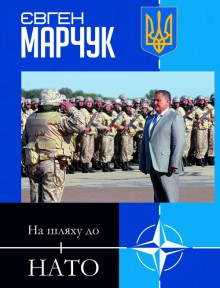The “Kyiv – Paris – Dakar” publishing house recently put out a book, Yevhen Marchuk. On the Way to NATO, which comprises speeches at the Ukrainian parliament, national and international forums as well as articles in the printed and electronic media on Ukraine-NATO relations by the well-known statesman Yevhen Marchuk. It is in fact the story of an individual who was trying on his own to pull this country out of the “quagmire” and predicted that Ukraine would face serious problems unless it joined the Alliance.
In a comment to The Day, the publishing house director Borys Klymenko said: “Yevhen Marchuk – the former Security Service chief, prime minister of Ukraine, National Security and Defense Council (RNBO) secretary, minister of defense, and now head of the Security Working Group of the Trilateral Contact Group for settling the situation in the Donbas at the Minsk negotiations – has been long known as one of Ukraine’s top statesmen and political figures who consistently work for Ukraine to pursue a Europe integration course.”
Indeed, Mr. Marchuk has played the main role in Ukraine’s movement towards NATO. It will be recalled that the course towards Ukraine’s accession to the North Atlantic alliance was approved on May 23, 2003, in the RNBO decision “On Ukraine’s Strategy towards NATO,” when Mr. Marchuk was the RNBO secretary. A year later, the basic principles and provisions of national security were laid down in the Law of Ukraine “On the Foundations of National Security.” Tellingly, the faction of the Party of Regions, led by Viktor Yanukovych at the time, also voted for this law.
Then in the summer of 2004, after the NATO Istanbul summit, Leonid Kuchma made a U-turn. When it became clear that Ukraine was a step away from signing the Membership Action Plan (MAP), Kuchma and Vladimir Putin suddenly vanished from the media’s field of view for a couple of days somewhere on the Azov Sea side. On coming back, Kuchma instructed that the provision on cooperation with NATO be immediately deleted from the military doctrine. Later on, when the Yanukovych team came to power, it pressured parliament into withdrawing this formula from the abovementioned law “On the Foundations of Ukraine’s National Security.”
We should also recall the NATO Bucharest summit in 2008, when German Chancellor Angela Merkel and the then French President Nicolas Sarkozy blocked granting the MAP to Ukraine and Georgia. As a result, Russia attacked Georgia in August of that year and illegally occupied 20 percent of this Caucasian republic’s territory. And the year before last, obviously knowing that NATO will not react, as was in the case of Georgia, Russia illegally annexed Crimea and occupied a part of the Donbas. The war in eastern Ukraine is still going on.
Since its inception, the newspaper Den has been a consistent supporter and propagandist of this country’s Euro-Atlantic course. The owners of popular TV channels did not pay much attention to this subject – moreover, inviting such odious politicians as Kolesnichenko and Tsariov to talk shows, they torpedoed the idea of Ukraine’s integration into NATO.
The book, published as part of the Ukrainian Book program of the State Committee for Television and Radio of Ukraine, comprises media publications for the period of 2000-16 on the conditions, possibilities, and mandatory actions which the Ukrainian state and society must do to be prepared to enter the circle the countries that have been building a collective security system since 1949.
“Owing to Mr. Marchuk’s sincere manner of setting forth a complicated geopolitical material, this publication can serve as a school and university textbook and a manual for lawmakers of all levels, central and local government officials, members of the governing bodies of political parties and nongovernmental organizations, as well as media people. The author’s professional knowledge of the matter and his profound confidence in the necessity of the described steps on the path to NATO makes the book a factor that forms the reader’s world-view, for all this is based on the experience of a person whose example any conscientious citizen of Ukraine will consider worthy of being followed. The book contains 540 pages of text and 60 pages of illustrations, which allows it to be used as an up-to-date presentation material,” Klymenko said.
Asked about the impact the book may have, taking into account that our country is at war with its northern neighbor, he said: “Owing to the Russian Federation’s aggression against Ukraine and the ensuing changes in awareness, Ukrainian citizens have at last understood that to be under protection of the North Atlantic Treaty Organization is much better than to hope for Russia’s peaceful efforts. We have already seen this in the case of Abkhazia, South Ossetia, Georgia, and Transnistria. This book, which gathers the theoretical and practical experience of one of the most consistent advocates of Ukraine’s Europe integration course, should be spread as widely as possible in both printed and electronic versions among all the strata of the population, and, first of all, it should be popularized through the people who recently assumed offices – from lowest-level councilors to members of parliament. Not all of them have had an opportunity to acquire deep knowledge of these issues, but they must do this, for they are decision-makers now.”








